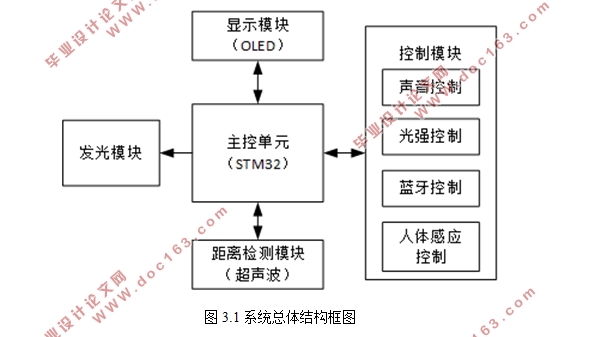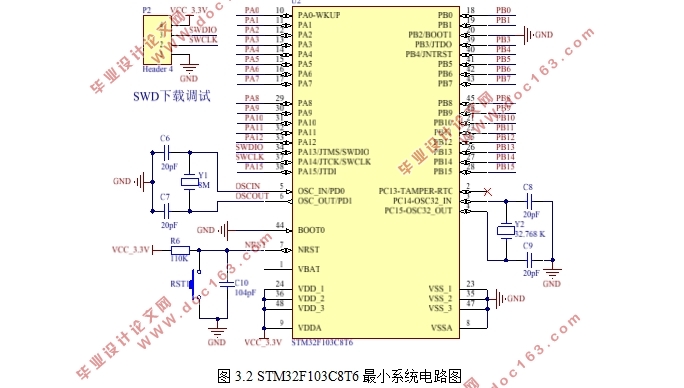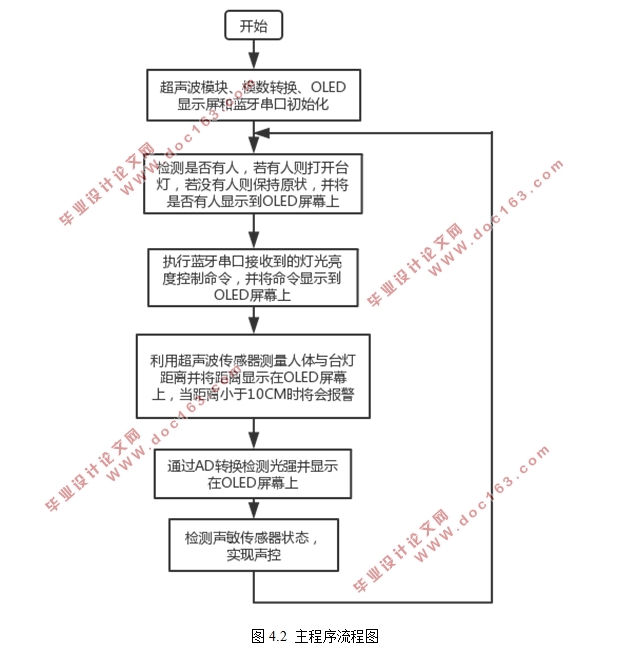基于STM32单片机的多功能智能台灯

1.无需注册登录,支付后按照提示操作即可获取该资料.
2.资料以网页介绍的为准,下载后不会有水印.资料仅供学习参考之用.
密 惠 保
基于STM32单片机的多功能智能台灯(论文14000字)
摘要:为实现日常台灯的多功能化和更加便捷,本文设计了一种基于STM32单片机的多功能智能台灯。该系统利用STM32作为主控单元,采用HC-SR505人体感应模块实现用户离开时自动关灯以节省能源,可以测量光强并显示到SSD1306液晶屏。利用超声波模块测量人与模块的距离并将其显示在液晶屏上,如果距离太近,则启动蜂鸣器报警提醒使用者调整坐姿以防止近视。通过声音控制灯的开关实现声控,同时增加蓝牙模块来实现对台灯的远程控制。本智能台灯最终实现了声控、蓝牙控制、人体控制等多种功能,符合人们日常生活对于照明的需求。
关键词:STM32微处理器;光敏电阻;HC-SR505人体感应模块
Multifunctional intelligent table lamp based on STM32 single chip microcomputer
Abstract:In order to realize the multi-functionality of the desk lamp,making the table lamp for daily use become more convenient.This paper designs a multi-functional intelligent table lamp based on STM32 single-chip microcomputer. It uses STM32 as the main control unit and uses HC-SR505 human body sensing module to realize automatic turn-off when the user leaves, saving energy, measuring light intensity and displaying to SSD1306 LCD screen. on. The ultrasonic module is used to measure the distance between the human distance module and display the distance to the liquid crystal screen. If the distance is too close, the buzzer alarm is used to remind the user that the sitting posture needs to be adjusted to prevent myopia. In addition, the sound control can be realized by the switch of the sound control lamp, and on this basis, the Bluetooth module is added to realize the remote control of the desk lamp.The smart table lamp finally realizes the functions of voice control, Bluetooth control, human body control, etc., and meets the needs of people's daily life for lighting.
Key words:STM32 microprocessor; photoresistor; HC-SR505 human body sensing modul
[资料来源:THINK58.com]



目录
1绪论 1
1.1研究背景 1
1.2研究意义 2
1.3国内外研究现状 3
1.4本课题的设计任务及主要内容 4
2系统方案对比选型 5
2.1测距模块方案选型 5
2.2通信模块选型 5
[来源:http://www.think58.com]
2.3微控制器选型 6
3系统硬件设计 6
3.1系统硬件结构框图 6
3.2模块硬件选型 7
3.2.1主控制模块设计 7
3.2.2发光模块设计 8
3.2.3显示模块设计 9
3.2.4距离检测模块设计 10
3.2.5控制模块设计 11
3.2.6电源管理模块设计 13
4系统软件设计 14
4.1 STM32开发环境介绍 14
4.2软件总体结构设计 14
4.3人体感应与声敏控制程序 15
4.4蓝牙串口命令接收模块 16
4.5距离检测模块软件设计 17
4.6光照亮度模块软件设计 18
4.7中断服务程序设计 18
5系统测试 18
6总结与展望 21
6.1总结 21
6.2展望 22
参考文献 22
[来源:http://www.think58.com]
致谢 24
